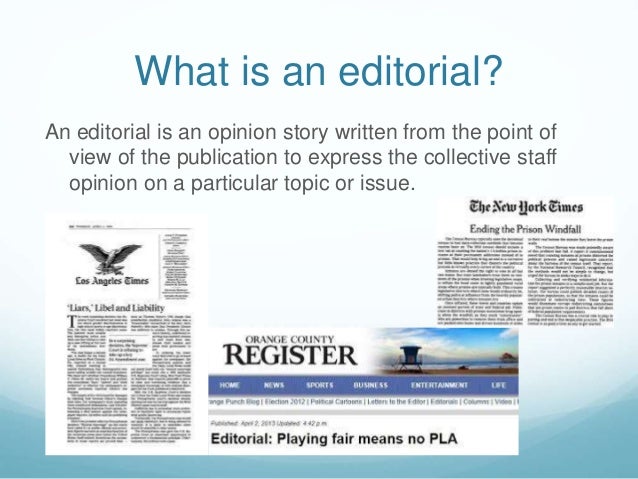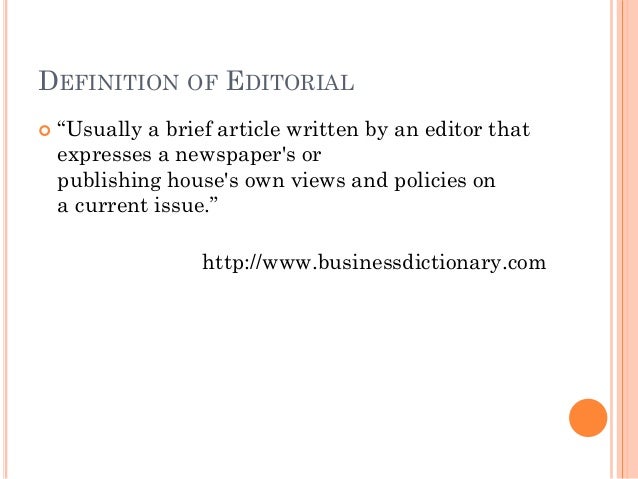The city Historical Commission needs to recognize that buildings, sites, and neighborhoods essential to telling the story of Black Philadelphia deserve protection and preservation. New Jersey Attorney General Gurbir Grewal's groundbreaking policy reforms will prohibit state, county, and local police. This year saw a wave of protests in reaction to the death of George Floyd. The stated purpose of the more peaceful ones went well beyond an effort. Read the well-informed political editorials at the Washington Times and stay engaged in what promises to be an interesting year. Latest Headlines. Editorial: Trump was rightly impeached. Now the Senate must do its job and convict. Editorial: Trump was rightly impeached.
Also found in: Thesaurus, Encyclopedia, Wikipedia.
ed·i·to·ri·al
(ĕd′ĭ-tôr′ē-əl)n.editorial
(ˌɛdɪˈtɔːrɪəl) adj
ed•i•to•ri•al
(ˌɛd ɪˈtɔr i əl, -ˈtoʊr-)n.
| Noun | 1. | editorial - an article giving opinions or perspectives newspaper column, column newspaper, paper - a daily or weekly publication on folded sheets; contains news and articles and advertisements; 'he read his newspaper at breakfast' article - nonfictional prose forming an independent part of a publication agony column - a newspaper column devoted to personal problems |
| Adj. | 1. | editorial - of or relating to an article stating opinions or giving perspectives; 'editorial column' |
| 2. | editorial - relating to or characteristic of an editor; 'editorial duties' |
editorial
[ˌedɪˈtɔːrɪəl]editorial experience → experienciaf en edición de textos
editorial staff → redacciónf
editorial
[ˌɛdɪˈtɔːriəl]the editorial staff → la rédaction
Editorials And Opinions
editorial
adj
editorial
[ˌɛdɪˈtɔːrɪəl]editorial assistant → assistentem/f di redazione
editorial staff → redazionef
edit
(ˈedit) verb
 ) adjective
) adjectiveWant to thank TFD for its existence? Tell a friend about us, add a link to this page, or visit the webmaster's page for free fun content.
Link to this page:
Writing an Editorial
Another Tutorial by:
Alan Weintraut
Annandale High School
Annandale, VA 22312
Atraut@aol.com
CHARACTERISTICS OF EDITORIAL WRITING
An editorial is an article that presents the newspaper's opinion on an issue. It reflects the majority vote of the editorial board, the governing body of the newspaper made up of editors and business managers. It is usually unsigned. Much in the same manner of a lawyer, editorial writers build on an argument and try to persuade readers to think the same way they do. Editorials are meant to influence public opinion, promote critical thinking, and sometimes cause people to take action on an issue. In essence, an editorial is an opinionated news story.
Editorials have:
1. Introduction, body and conclusion like other news stories
2. An objective explanation of the issue, especially complex issues
3. A timely news angle
4. Opinions from the opposing viewpoint that refute directly the same issues the writer addresses
5. The opinions of the writer delivered in a professional manner. Good editorials engage issues, not personalities and refrain from name-calling or other petty tactics of persuasion.
6. Alternative solutions to the problem or issue being criticized. Anyone can gripe about a problem, but a good editorial should take a pro-active approach to making the situation better by using constructive criticism and giving solutions.
7. A solid and concise conclusion that powerfully summarizes the writer's opinion. Give it some punch.
Four Types of Editorials Will:
1. Explain or interpret: Editors often use these editorials to explain the way the newspaper covered a sensitive or controversial subject. School newspapers may explain new school rules or a particular student-body effort like a food drive.
2. Criticize: These editorials constructively criticize actions, decisions or situations while providing solutions to the problem identified. Immediate purpose is to get readers to see the problem, not the solution.
3. Persuade: Editorials of persuasion aim to immediately see the solution, not the problem. From the first paragraph, readers will be encouraged to take a specific, positive action. Political endorsements are good examples of editorials of persuasion.
4. Praise: These editorials commend people and organizations for something done well. They are not as common as the other three.
Writing an Editorial
1. Pick a significant topic that has a current news angle and would interest readers.
2. Collect information and facts; include objective reporting; do research
3. State your opinion briefly in the fashion of a thesis statement
4. Explain the issue objectively as a reporter would and tell why this situation is important
5. Give opposing viewpoint first with its quotations and facts
6. Refute (reject) the other side and develop your case using facts, details, figures, quotations. Pick apart the other side's logic.
7. Concede a point of the opposition — they must have some good points you can acknowledge that would make you look rational.
8. Repeat key phrases to reinforce an idea into the reader's minds.
9. Give a realistic solution(s) to the problem that goes beyond common knowledge. Encourage critical thinking and pro-active reaction.
10. Wrap it up in a concluding punch that restates your opening remark (thesis statement).
11. Keep it to 500 words; make every work count; never use 'I'
A Sample Structure
I. Lead with an Objective Explanation of the Issue/Controversy.
Include the five W's and the H. (Members of Congress, in effort to reduce the budget, are looking to cut funding from public television. Hearings were held …)
- Pull in facts and quotations from the sources which are relevant.
- Additional research may be necessary.
II. Present Your Opposition First.
As the writer you disagree with these viewpoints. Identify the people (specifically who oppose you. (Republicans feel that these cuts are necessary; other cable stations can pick them; only the rich watch public television.)
- Use facts and quotations to state objectively their opinions.
- Give a strong position of the opposition. You gain nothing in refuting a weak position.
III. Directly Refute The Opposition's Beliefs.
You can begin your article with transition. (Republicans believe public televison is a 'sandbox for the rich.' However, statistics show most people who watch public television make less than $40,000 per year.)
- Pull in other facts and quotations from people who support your position.
- Concede a valid point of the opposition which will make you appear rational, one who has considered all the options (fiscal times are tough, and we can cut some of the funding for the arts; however, …).

IV. Give Other, Original Reasons/Analogies
In defense of your position, give reasons from strong to strongest order. (Taking money away from public television is robbing children of their education …)
- Use a literary or cultural allusion that lends to your credibility and perceived intelligence (We should render unto Caesar that which belongs to him …)
V. Conclude With Some Punch.
Give solutions to the problem or challenge the reader to be informed. (Congress should look to where real wastes exist — perhaps in defense and entitlements — to find ways to save money. Digging into public television's pocket hurts us all.)
Editorials Articles
- A quotation can be effective, especially if from a respected source
- A rhetorical question can be an effective concluder as well (If the government doesn't defend the interests of children, who will?)
Go to the library or any computer lab and complete the “webquest” located at
http://library.thinkquest.org/50084/index.shtml
